
Denim jeans, whether a favorite of cowboys, a crucial element in higher-end fashion, or simply a part of daily wear, carry a unique blend of style, comfort, and durability. They are a staple in various wardrobes around the world. If you’ve spent time and money to break in the denim so that it fits perfectly, understanding how to wash jeans becomes vital.
This guide will detail the best methods to wash and care for your jeans, ensuring they last and stay as good as new for years. Here’s how to do it:
Launder Jeans as Little as Possible
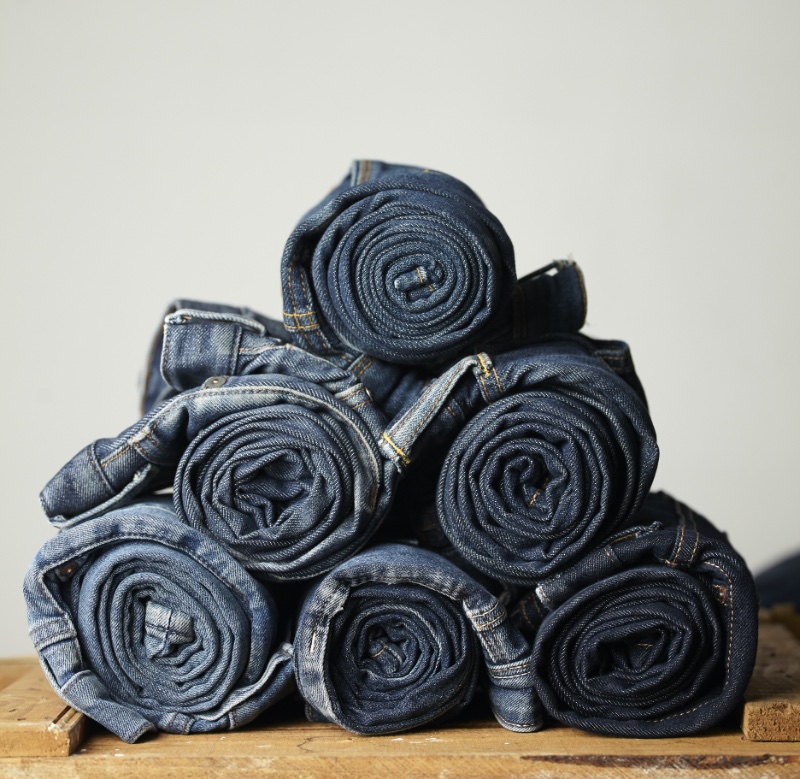
Denim, a robust natural-fiber fabric, is celebrated for its resilience and adaptability, suitable for rugged labor and sophisticated style. While washing jeans too frequently can hasten their deterioration, failing to wash them enough might lead to unsightly stains or undesirable smells.
Finding the right balance in washing jeans is vital to preserving their integrity and prolonging their usefulness. Striking this equilibrium means understanding when to wash and when to opt for alternative methods like spot cleaning or airing them out.
Levi’s CEO Chip Bergh drew attention a few years ago when he revealed in an interview that he had never washed the ten-year-old jeans he wore. While this approach might seem extreme (and, to some, unappealing), experts concur that washing denim too frequently leads to wearing it faster.
Levi’s official website suggests washing jeans only after every ten wearings, but some other opinions advocate for a reasonable interval of five to six wearings.

A few streaks of dirt or minor food spills on your jeans don’t necessitate a complete wash. Spot cleaning with a wet washcloth or a baby wipe often suffices. Consider using an old toothbrush and a little baking soda for more persistent stains, then allow the jeans to air dry.
If your denim starts feeling slightly off between washes and you wish to freshen them up, hanging them in the bathroom during a hot shower can act as a quick steam bath. Another unconventional method some clothing experts recommend for odor control is placing the jeans in a plastic bag and freezing them for 24-48 hours. This freezing technique is believed to kill the bacteria responsible for unwanted scents.
Learning How to Wash Jeans
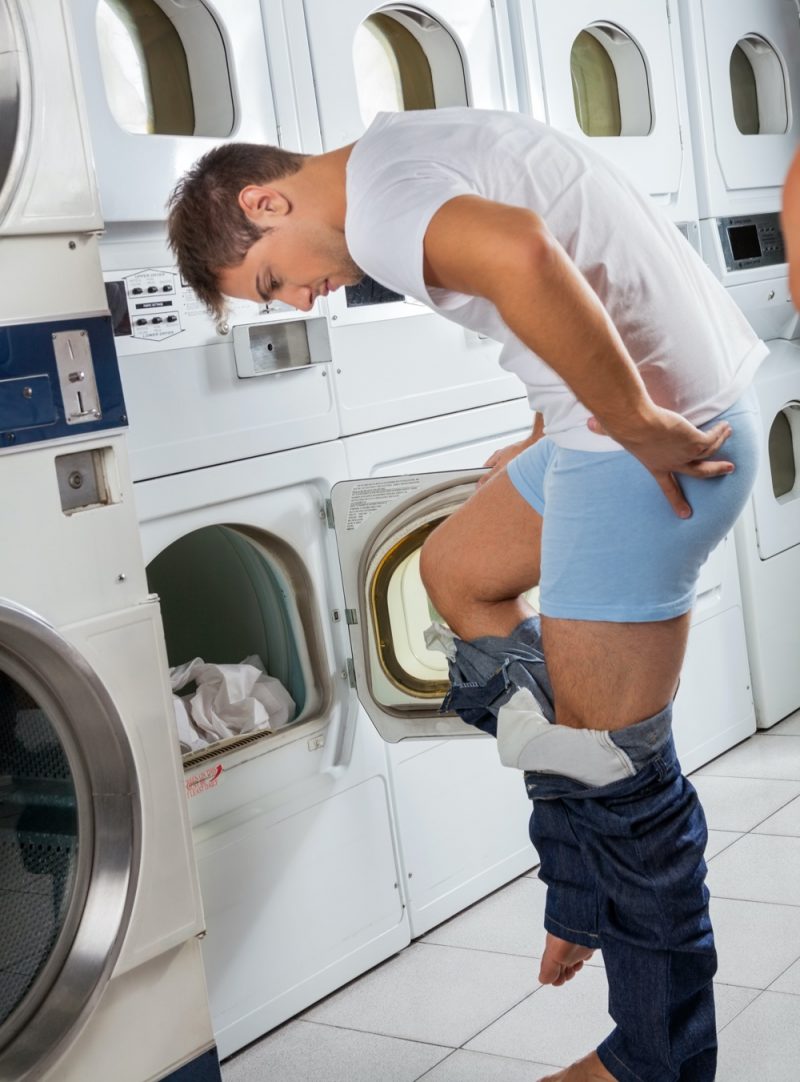
Washing jeans properly can be the difference between a pair that lasts for years and quickly loses shape and color. Understanding the right balance in washing jeans is vital to preserving their integrity and prolonging their usefulness.
Pre-wash Preparation
Before tossing your jeans into the washing machine, check all pockets; you don’t want to find them ruined by a pen or chewing gum left behind. Then, turn the jeans inside out and wash them in cold water to prevent shrinking or fading.
When you have new jeans, check the hang tags for cleaning instructions before you discard them, and read any labels inside. Since they will fade over time, you might want to cut out the care labels and save them with the tags to keep a record of the information.
Washing Technique
The washing method for jeans hinges on factors like the type, color, and individual preferences. Two principal approaches to cleaning jeans are hand washing and machine washing. When selecting a detergent, it’s essential to avoid those that claim to brighten colors or produce “whiter whites,” as they contain optical brighteners that can cause denim and darker shades to fade.
Hand Washing Jeans
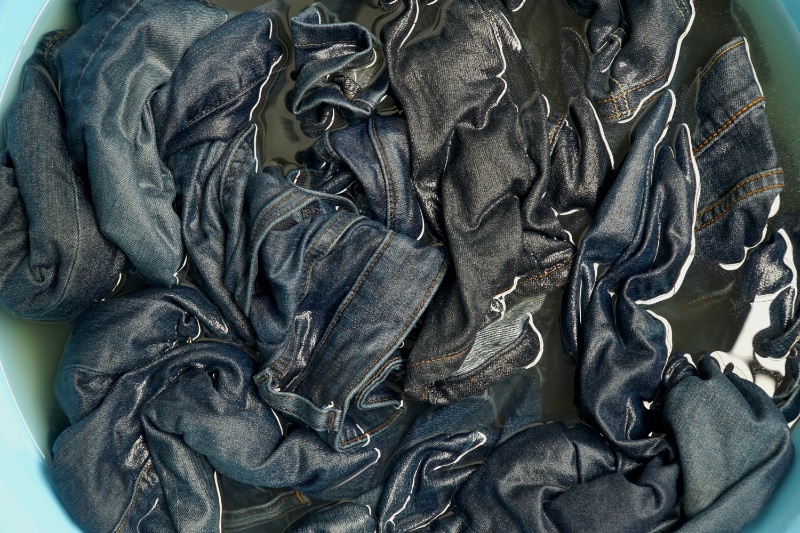
Hand washing can be the most effective method to maintain your jeans’ color, especially for dark denim. Here’s how:
- Fill a sink or a tub with cold water.
- Add a small amount of liquid detergent and mix well.
- Submerge your jeans in the water and wash them for a few minutes, gently removing any spots without excessive rubbing.
- Let them soak for about 30-60 minutes.
- Drain the water and rinse your jeans thoroughly.
- Gently squeeze out the excess water without wringing it.
- Hang them to dry right-side out.
Machine Washing Jeans
Machine washing is less labor-intensive than hand washing and is suitable for most jeans. Be careful of what you wash your jeans with. Make a load of dolors, including just one or two pieces of denim per load. Denim gets very heavy when wet; too much in a laundry load will make it difficult for water and detergent to circulate and clean properly. Here are the steps to follow:
- Turn your jeans inside out.
- Place them in the washing machine and select a ‘delicate’ cycle with a low spin speed.
- Add a small amount of non-bleach liquid detergent.
- Once the wash cycle is complete, immediately remove the jeans, turn them right-side out, and hang them to dry.
Drying Your Jeans
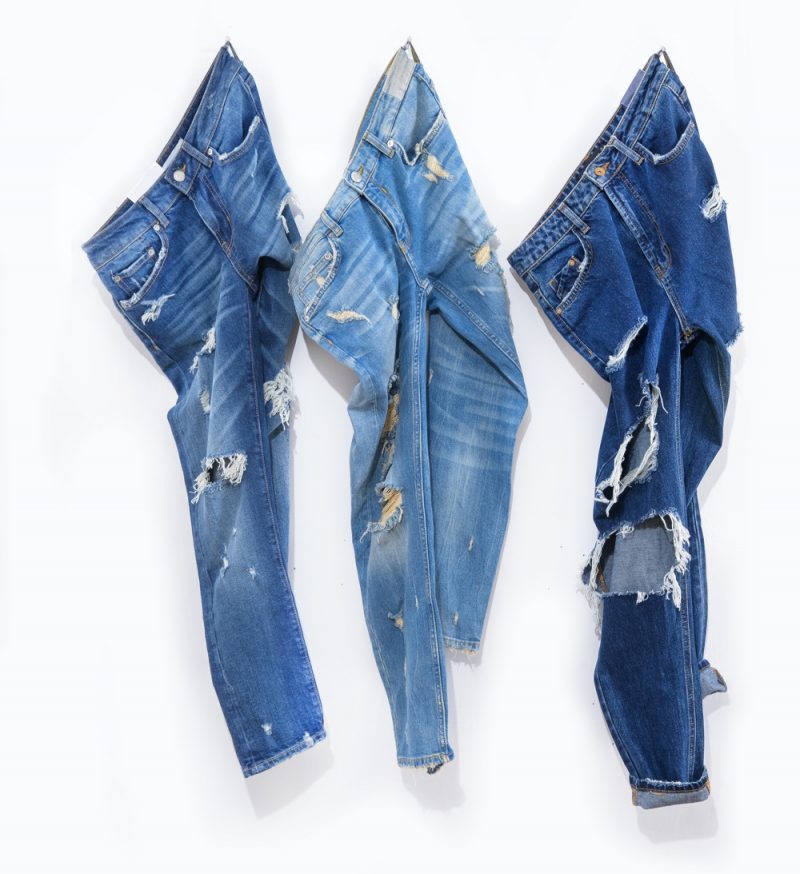
Drying your jeans correctly is just as crucial as washing them. It’s best to minimize electric dryer use with your denim clothes. As Levi’s website points out, the lint in the lint screen is produced by the gradual disintegration of the clothes you are drying. Instead, air drying your jeans is the most recommended method:
- Hang them to dry by draping them over your shower curtain bar, drying rack, or dry flat.
- If you must tumble dry, remove them while still damp and allow them to finish air-drying. Keep them inside while drying, especially if you hang them outdoors in sunlight.
When You Do Wash Your Denim, Do It Gently
If you have decorated jeans with detailed embroidery or studs, “distressed” jeans, which are manufactured with rips and abraded spots, or jeans that have acquired the look naturally over time, wash them by hand using detergent meant for hand washing, such as Woolite.
Worn fabric is more delicate and prone to unintended damage, so holes and dangling threads from fraying can become entangled with other clothes.
Maintaining Your Jeans Between Washes
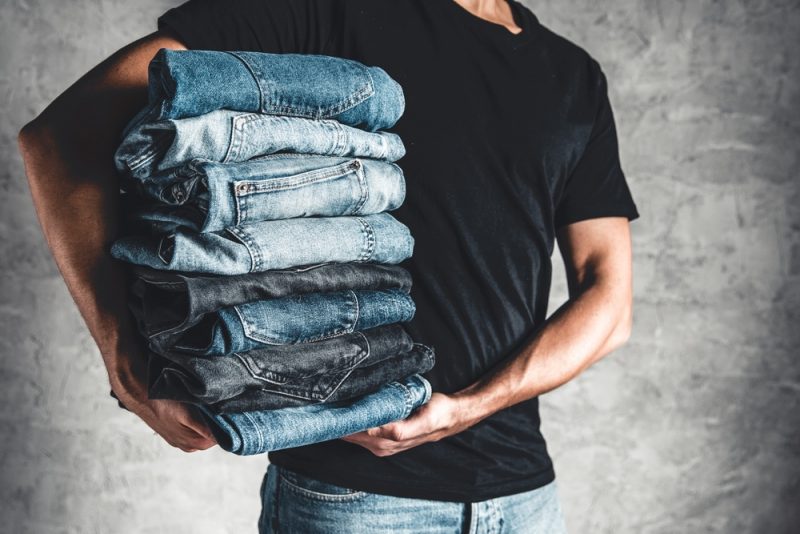
Caring for your jeans between wearings is essential for preserving their comfort, fit, and appearance. Hang your jeans up rather than tossing them on the floor after wearing them; Experts recommend s-hooks over the closet clothes bar, though clip hangers without metal parts can also be used.
Ensuring that denim has space to breathe prevents it from becoming stale, so avoid crowding it in the closet or folding it in a drawer. Promptly spot-clean any dirt or food spills to avoid deep-set stains, keeping it fresh for longer.
If signs of wear appear, such as a tear or loose pocket, several options are available. For those handy with a needle and thread or a sewing machine, a DIY repair or patch can add a unique touch.
Bright embroidery thread in a unique pattern can fix a hole while personalizing the jeans. Alternatively, local tailors can provide repairs at a fraction of the cost of a new pair, and even online businesses specialize in jean-specific fixes such as gaping buttonholes or torn belt loops.
Special Care for Different Types of Jeans
Jeans come in various styles, and each type has unique care needs. Recognizing your jeans’ specific requirements can preserve their appearance and prolong their lifespan.
Raw Denim Jeans
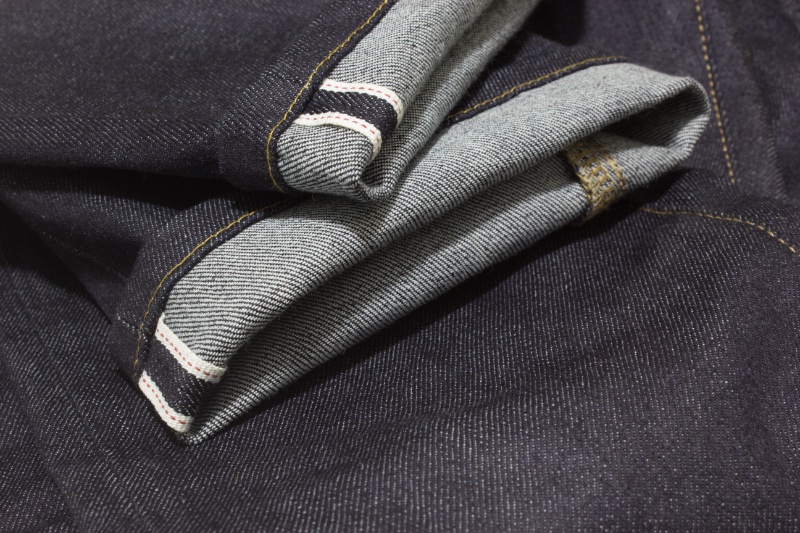
Raw denim jeans are crafted from unwashed and untreated denim, lending a distinct fit that molds to your body with wear. Experts often advise wearing raw denim jeans at least 30 times before washing.
Hand washing with a mild detergent and air drying are the preferred methods to maintain their quality.
Black Denim Jeans
Black denim is prone to fading over time. To retain the rich black color, minimize washing and wash by hand when necessary. A tip to prevent color fading is to add vinegar during the wash.
Industrially-Abraded Jeans
Also known as pre-washed jeans, industrially abraded jeans have a pre-faded appearance that generally holds its color through washing. Machine washing is acceptable for these jeans, but mindful care is required as they may not endure as long as raw or one-wash jeans.
Additional Tips for Long-Lasting Jeans

To keep your jeans looking their best, consider the following strategies:
- Spot clean when needed using a wet washcloth or a baby wipe.
- Opt for plant-based detergents, which are milder on the fabric.
- Allow jeans to air-dry on drying racks or hang them, avoiding tumble drying when possible.
- Promptly address signs of wear, such as tears or loose pockets, as timely repairs can prevent further deterioration.
By tailoring your care approach to the specific type of jeans, you can ensure that your favorite pairs maintain their comfort and style for years.
Final Thoughts
Denim jeans have become a universal piece of clothing, echoing individuality and style. This guide has offered a glimpse into the nuanced world of jean care, uncovering the often-overlooked significance of proper washing and maintenance.
By following these specialized approaches tailored to different types of jeans, you can ensure your favorite pairs continue to fit well, look great, and tell a story that’s uniquely their own. Embracing the culture of denim isn’t just about fashion; it’s about appreciating the fabric’s history and treating it with the care it demands.
As this guide has illustrated, proper care for jeans isn’t merely a routine task but an essential aspect of preserving their integrity and prolonging their life. Whether a pair of jeans is worn for work or play, casual outings, or formal events, caring for them appropriately adds a personal touch, ensuring they remain a comfortable and stylish companion for years to come.




